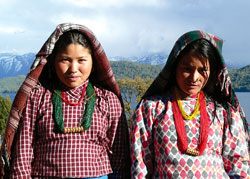|
|
| CHILD BRIDES: 15-year-olds Shova and Laxmi Karki, both wear the tilahari that signify they are married. |
"Ke garne," says Bali Raj Biswokarma (BK) as he talks of his marriage, arranged by his parents when he was 16. "Tradition got me married really young but the same will not happen to my daughter." He pauses for a second before defiantly adding, "She will go to school."
At 18, Bali Raj is already a father and works as a porter to fend for his wife, four-month-old daughter, and his parents. He usually sits by the Talcha airport with a rope in hand and bargains with the travellers and trekkers to carry their goods to their destination. Depending on the length of each trip, he earns anywhere from Rs 500 to Rs 3,000.
The story is the same with many of Karnali's young people-most are married off early, some even before they enter their teens.
Khadga Raj BK was married off at 13 to a girl of the same age, but unlike many of his friends, he is privileged to still be attending school. He proudly shares his school's name "Mahakali Uccha Madyamik Vidyalaya in Srinagar-I'm in grade seven," he nods approvingly. But his bride stays at home as the traditional dutiful wife, as is expected of her.
Some girls occasionally have the freedom to visit relatives and friends. Shova and Laxmi Karki , both 15, had come to attend the Rara festival recently held in the area. Though they did not admit to being married, the tilahari each wore suggested otherwise. Both had never been to school and said, "we look after the cows, but our brothers go to school."
Mugu has 124 schools but despite this impressive number for such a remote region-accessible only by foot or expensive flights-there is a low turnout of girls attending school. "Child marriage has always been a tradition here but that is slowly changing. I think because of that, the number of girls attending school is also improving gradually," says Badrinath Dhungana, teacher at the Janjyoti Madhyamik Vidyala, Na Tharpu.
That may be positive sign but obviously, more can be done to speed up the progress. For Nepal's government and most of the locals here, roads remain the top priority. No doubt once the roads are built, they will open up Karnali to everything from farm to forest produce in the markets down south. But along with the roads, there is something equally important that needs to be addressed for Karnali's future generations-access to education for the female child.
As a distinguished visitor at the festival observed, "That bit of carefully planned infrastructure could be instrumental in changing the lives of Karnali's people but unless there is equal access to education for the girl child, social flaws like child marriage will continue to be practised."



